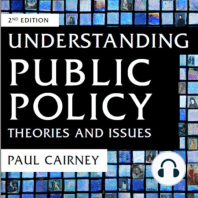10 min listen

Policy Concepts in 1000 Words: the intersection between evidence and policy transfer
Policy Concepts in 1000 Words: the intersection between evidence and policy transfer
ratings:
Length:
12 minutes
Released:
Jan 12, 2021
Format:
Podcast episode
Description
From Policy Concepts in 1000 Words: the intersection between evidence and policy transfer
We can generate new insights on policymaking by connecting the dots between many separate concepts. However, don’t underestimate some major obstacles or how hard these dot-connecting exercises are to understand. They may seem clear in your head, but describing them (and getting people to go along with your description) is another matter. You need to set out these links clearly and in a set of logical steps. I give one example – of the links between evidence and policy transfer – which I have been struggling with for some time.
In this post, I combine three concepts – policy transfer, bounded rationality, and ‘evidence-based policymaking’ – to identify the major dilemmas faced by central government policymakers when they use evidence to identify a successful policy solution and consider how to import it and ‘scale it up’ within their jurisdiction. For example, do they use randomised control trials (RCTs) to establish the effectiveness of interventions and require uniform national delivery (to ensure the correct ‘dosage’), or tell stories of good practice and invite people to learn and adapt to local circumstances? I use these examples to demonstrate that our judgement of good evidence influences our judgement on the mode of policy transfer.
Insights from each concept
From studies of policy transfer, we know that central governments (a) import policies from other countries and/ or (b) encourage the spread (‘diffusion’) of successful policies which originated in regions within their country: but how do they use evidence to identify success and decide how to deliver programs?
From studies of ‘evidence-based policymaking’ (EBPM), we know that providers of scientific evidence identify an ‘evidence-policy gap’ in which policymakers ignore the evidence of a problem and/ or do not select the best evidence-based solution: but can policymakers simply identify the ‘best’ evidence and ‘roll-out’ the ‘best’ evidence-based solutions?
To read on, see Policy Concepts in 1000 Words: the intersection between evidence and policy transfer
We can generate new insights on policymaking by connecting the dots between many separate concepts. However, don’t underestimate some major obstacles or how hard these dot-connecting exercises are to understand. They may seem clear in your head, but describing them (and getting people to go along with your description) is another matter. You need to set out these links clearly and in a set of logical steps. I give one example – of the links between evidence and policy transfer – which I have been struggling with for some time.
In this post, I combine three concepts – policy transfer, bounded rationality, and ‘evidence-based policymaking’ – to identify the major dilemmas faced by central government policymakers when they use evidence to identify a successful policy solution and consider how to import it and ‘scale it up’ within their jurisdiction. For example, do they use randomised control trials (RCTs) to establish the effectiveness of interventions and require uniform national delivery (to ensure the correct ‘dosage’), or tell stories of good practice and invite people to learn and adapt to local circumstances? I use these examples to demonstrate that our judgement of good evidence influences our judgement on the mode of policy transfer.
Insights from each concept
From studies of policy transfer, we know that central governments (a) import policies from other countries and/ or (b) encourage the spread (‘diffusion’) of successful policies which originated in regions within their country: but how do they use evidence to identify success and decide how to deliver programs?
From studies of ‘evidence-based policymaking’ (EBPM), we know that providers of scientific evidence identify an ‘evidence-policy gap’ in which policymakers ignore the evidence of a problem and/ or do not select the best evidence-based solution: but can policymakers simply identify the ‘best’ evidence and ‘roll-out’ the ‘best’ evidence-based solutions?
To read on, see Policy Concepts in 1000 Words: the intersection between evidence and policy transfer
Released:
Jan 12, 2021
Format:
Podcast episode
Titles in the series (34)
Policy Concepts in 1000 Words: The Psychology of Policymaking by Understanding Public Policy (in 1000 and 500 words)